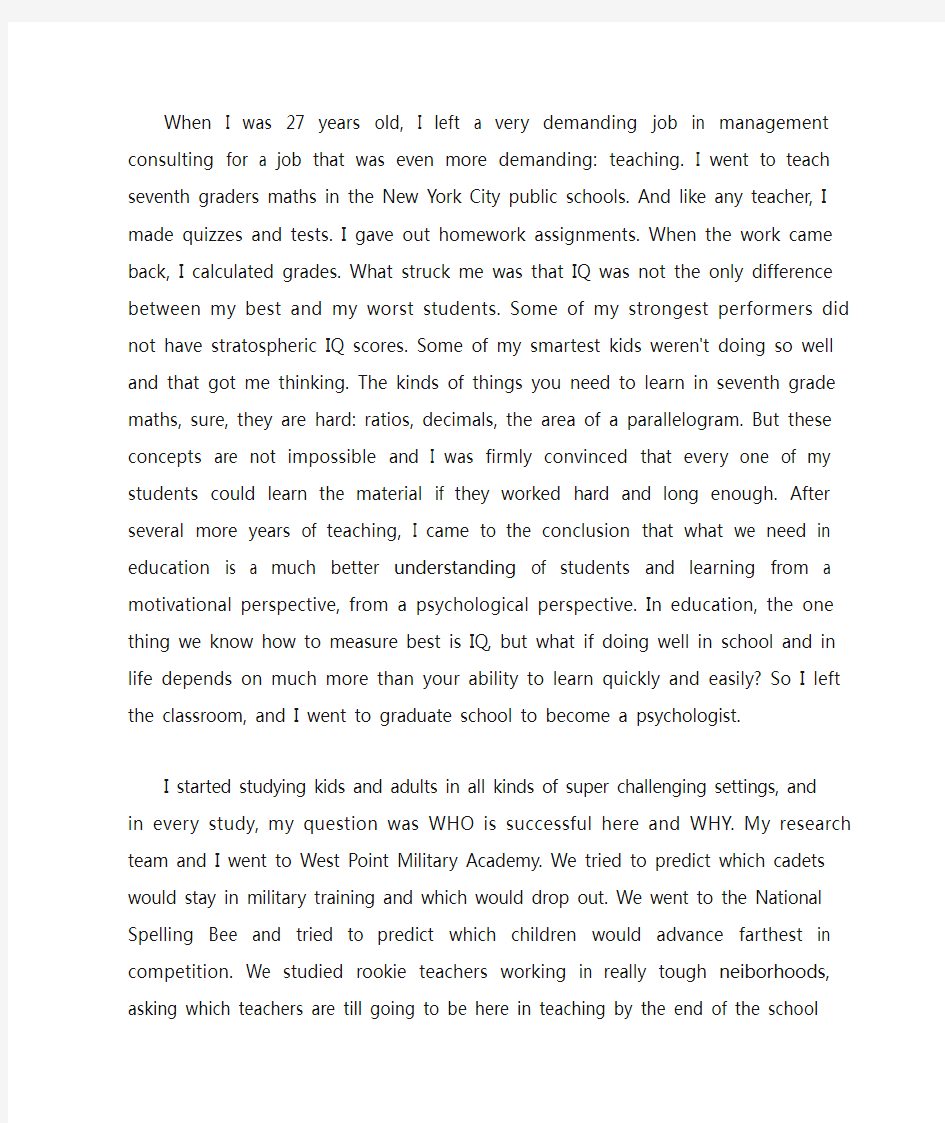TEDAngela Lee通往成功的秘诀--耐力 演讲稿

- 1、下载文档前请自行甄别文档内容的完整性,平台不提供额外的编辑、内容补充、找答案等附加服务。
- 2、"仅部分预览"的文档,不可在线预览部分如存在完整性等问题,可反馈申请退款(可完整预览的文档不适用该条件!)。
- 3、如文档侵犯您的权益,请联系客服反馈,我们会尽快为您处理(人工客服工作时间:9:00-18:30)。
When I was 27 years old, I left a very demanding job in management consulting for a job that was even more demanding: teaching. I went to teach seventh graders maths in the New York City public schools. And like any teacher, I made quizzes and tests. I gave out homework assignments. When the work came back, I calculated grades. What struck me was that IQ was not the only difference between my best and my worst students. Some of my strongest performers did not have stratospheric IQ scores. Some of my smartest kids weren't doing so well and that got me thinking. The kinds of things you need to learn in seventh grade maths, sure, they are hard: ratios, decimals, the area of a parallelogram. But these concepts are not impossible and I was firmly convinced that every one of my students could learn the material if they worked hard and long enough. After several more years of teaching, I came to the conclusion that what we need in education is a much better understanding of students and learning from a motivational perspective, from a psychological perspective. In education, the one thing we know how to measure best is IQ, but what if doing well in school and in life depends on much more than your ability to learn quickly and easily? So I left the classroom, and I went to graduate school to become a psychologist.
I started studying kids and adults in all kinds of super challenging settings, and in every study, my question was WHO is successful here and WHY. My research team and I went to West Point Military Academy. We tried to predict which cadets would stay in military training and which would drop out. We went to the National Spelling Bee and tried to predict which children would
advance farthest in competition. We studied rookie teachers working in really tough neiborhoods, asking which teachers are till going to be here in teaching by the end of the school year, and of those, who will be the most effective at improving learning outcomes for their students. We partnered with private companies, asking which of these salespeople is going to keep their jobs and who's going to earn the most money. In all those very different contexts, one characteristic emerged as a significant predictor of success and it wasn't social intelligence. It wasn't good looks, physical health, and it wasn't IQ. It was grit.
Grit is passion and perseverance for very long term goals. Grid is having stamina. Grit is sticking with your future, day in day out, not just for the week, not just for the month, but for years, and working really hard to make that future a reality. Grit is living life like it's a marathon,not a sprint. A few years ago, I started studying grit in the Chicago public schools. I asked thousands of high school juniors to take grit questionnaires, and then waited around more than a year to see who would graduate. Turns out that grittier kids were significantly more likely to graduate, even when I matched them on every characteristic I could measure, things like family income, Standardized Achievement Test scores, even how safe kids felt when they were at school. So it's not just at West Point or the National Spelling Bee that grit matters. It's also in school, especially for kids at risk for dropping out.
To me, the most shocking thing about grit is how little we know, how little science knows, about building it. Everyday, parents and teachers ask me: how do I build grit in kids? what do I do to
